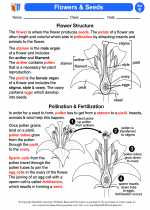Flowers and seeds -> excretory system
Excretory System
The excretory system is responsible for removing waste and excess substances from the body. It consists of several organs, including the kidneys, ureters, bladder, and urethra.
Kidneys
The kidneys are the main organs of the excretory system. They filter waste products and excess substances, such as urea, from the blood to form urine. The urine then travels from the kidneys to the bladder through the ureters.
Bladder
The bladder is a hollow, muscular organ that stores urine until it is expelled from the body. When the bladder is full, it sends signals to the brain, prompting the urge to urinate.
Urethra
The urethra is the tube through which urine exits the body. It connects the bladder to the external environment and allows for the expulsion of urine.
Functions of the Excretory System
- Removal of waste products, such as urea and excess salts, from the body
- Regulation of water and electrolyte balance
- Regulation of blood pressure by controlling blood volume and electrolyte levels
- Regulation of blood pH by controlling the excretion of hydrogen ions and bicarbonate
Key Terms
Here are some important terms related to the excretory system:
- Urea
- A nitrogenous waste product resulting from the breakdown of proteins
- Nephron
- The functional unit of the kidney responsible for filtering the blood and producing urine
- Filtration
- The process by which the kidneys remove waste products from the blood
- Osmoregulation
- The regulation of water and electrolyte balance in the body
Study Guide
Here are some key points to focus on when studying the excretory system:
- Understand the functions of the excretory system
- Learn the structure and function of the kidneys, ureters, bladder, and urethra
- Explore the process of urine formation and excretion
- Understand the importance of maintaining water and electrolyte balance
- Review the key terms and concepts related to the excretory system
[Excretory System] Related Worksheets and Study Guides:
.◂Science Worksheets and Study Guides Fifth Grade. Flowers and seeds

 Activity Lesson
Activity Lesson
 Worksheet/Answer key
Worksheet/Answer key
 Worksheet/Answer key
Worksheet/Answer key
 Worksheet/Answer key
Worksheet/Answer key
 Worksheet/Answer key
Worksheet/Answer key
 Vocabulary/Answer key
Vocabulary/Answer key
 Vocabulary/Answer key
Vocabulary/Answer key
